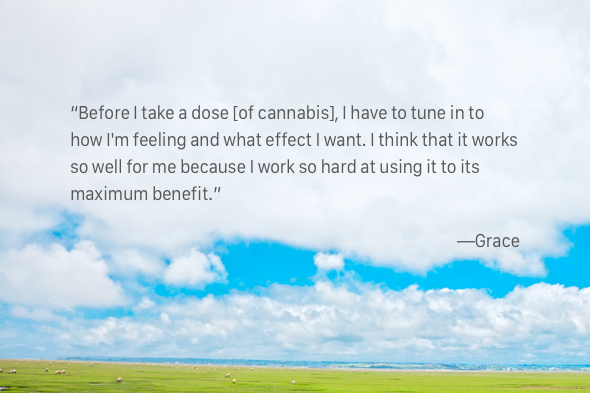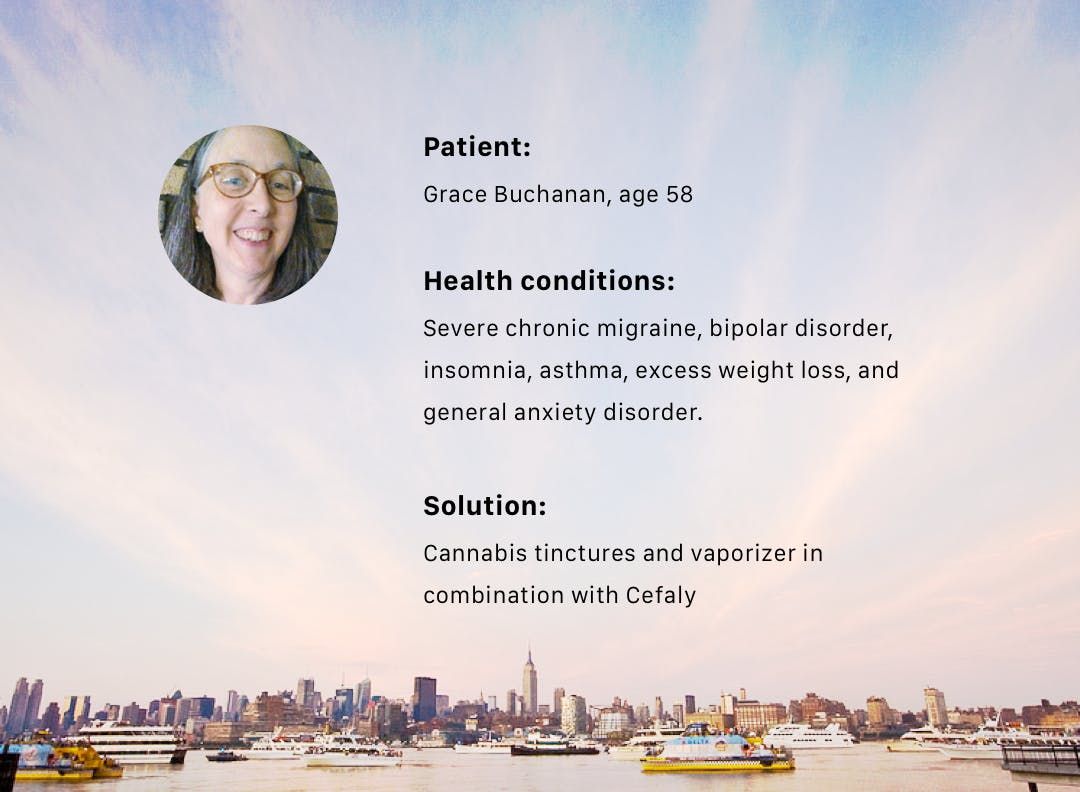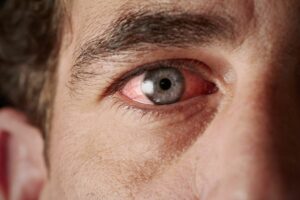New York’s medical cannabis program currently serves nearly 35,000 registered patients, and Grace Buchanan has been a certified patient since August 2017. This is her story of how cannabis provides relief for multiple conditions, including severe chronic migraines.
Dozens of Medications, Limited Results
Grace manages bipolar disorder, insomnia, asthma, excess weight loss and general anxiety disorder, but her migraines are the worst. “Migraine is my most disabling condition,” she says, explaining that the excruciating pain is just a portion of what she goes through during an attack.
“It begins with a day or two of battling excess energy, irritability and anxiety while my brain becomes unable to think straight,” she continues. “Then the pain and other symptoms kick in and overwhelm me to the point where I can’t even roll over in bed. Then I’m limp, depressed and exhausted as I recover for up to three days before the next attack begins.”
Nearly as exhaustive is the list of medications Grace has tried in the hopes of finding relief. “I tried Lamictal, Lexapro, Welbutrin, Abilify, Depakote, Lithium, Zyprexa, Tegretol, Zofran, Topamax, Symbicort, Advair, dexamethasone, Benadryl, hydromorphone, tizanidine, prednisone, ketorolac, Compro, and dihydroergotamine,” she explains. But the 58-year-old found that the side effects outweighed the benefits. “I wanted my life back,” she says.
Cannabis as a Viable Option for Pain Relief
Grace and her husband started looking into alternatives. “I was searching for something that would kill the pain and knock me out until the migraine attack was over,” she says.
But medical cannabis wasn’t an option at first; she didn’t even know it was legal in New York. “I wasn’t aware of how widespread legalized marijuana had become, and how many people were in favor of legalization,” she says, adding, “I thought that cannabis was only for recreational use, and I was not interested. I did not want to get high; I wanted to become more functional.”
But what they learned while researching caused her to reconsider. “I was impressed by the stories that I read on a migraine forum about the effectiveness of CBD oil,” she says.
Grace and her husband found out that not only did New York have a medical cannabis program, but that she was likely a qualifying patient: “We discovered that New York regulated CBD oil and had just added chronic pain to its list of legal uses of medical marijuana. I read the law and several dispensary application forms before I became a certified and registered patient. I’m impressed by the testing that New York requires … so I gave it a try.”
Grace visited two different registered organizations, but left empty-handed after it became clear in both instances that “the pharmacist didn’t know anything about how to use cannabis for migraine.”
Her visit to PharmaCannis’ Liverpool locationwould change everything. “Patient Care Representative McKenzie talks with me in a way that eases my mind about using cannabis,” Grace says. “She has also done a lot of research into my conditions and shares with me what she found, which helps me to do further research.”
Cannabis Helps Reduce Migraines & Much More

Grace, who became a certified patient on Aug. 4, 2017, started seeing results pretty quickly. “My asthma was the first thing to respond,” she says. “I rarely struggle for breath anymore.” She soon started seeing a shift in her most debilitating condition. “My chronic migraine symptoms decreased significantly in intensity and duration,” Grace explains. “I have much less pain, nausea, vomiting, exhaustion, dizziness, vertigo and distorted perception.”
Grace even noticed that the environmental factors that typically provoke a migraine attack now have a reduced effect. “I have less sensitivity to triggers such as most foods, many odors, weather changes, sunlight and other bright lights, and mild stress or excitement,” she says. “I have fewer episodes of anxiety.” She’s working on treating her insomnia with cannabis and hopes that it will also help her gain weight.
Grace now only uses nerve stimulator Cefaly daily to help with migraine attacks and, to a lesser degree, four other medications if needed. These days she rarely uses Klonopin.
Using Cannabis to Suit Her Specific Needs
Grace uses tinctures and vaporizers to administer the medicine using a layered approach. “Tonight I’m feeling wound up and a slight threat of a migraine, and I want help sleeping well,” she explains, “so I will use a little of the vape that calms me down and helps me get to sleep while reducing the risk of a migraine attack. I will also use my bedtime tincture to help me stay asleep and prevent a migraine attack.”
The flexible nature of the medicine allows Grace to customize use in order to target specific symptoms, taking the tincture for sleep while the vape is more likely to stop the progression of an oncoming migraine. Medical marijuana also works well in cooperation with her other prescriptions.
“If I have a migraine when I wake up tomorrow,” she explains, “I will probably take a small dose of my prescription medication, add a little of my night-time tincture that reduces the symptoms, support it with my normal dose of morning tincture that helps me to wake up and accomplish things, then add a higher dose of the vape that helps stop a migraine and relieves my anxiety.”
Mind-Body Connection with Medical Marijuana
Grace has come a long way from not knowing medical marijuana existed to championing it as medicine that works. “Cannabis can be used to increase functionality, not just as a ticket to la la land,” she says.
But she also wants folks to understand the many factors involved with taking medical marijuana. “Cannabis isn’t easy to use: Many products are available, and each person responds differently to each product,” she says. “A person’s response can vary according to different conditions such as stress, severity of illness and prior experience with marijuana.”
Understanding that many things can impact the effect of the medicine has resulted in Grace applying a truly holistic approach to her health and well-being. “Before I take a dose, I have to tune in to how I’m feeling and what effect I want,” she says. “I think that it works so well for me because I work so hard at using it to its maximum benefit.”
If you’re new to cannabis and want to learn more, take a look at our Cannabis 101 post. HelloMD can help you get your medical marijuana recommendation; it’s easy, private and 100% online.





